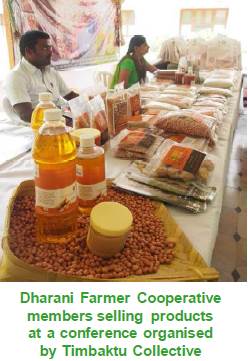|
Happy Farmers, Happy Earth
W ith 11 states declaring drought in the last 9 months and farmer suicides at a rate as high as 52 a day in 2015, one would expect conditions of despair and hopelessness from a district like Anathapuramu in Andhra Pradesh which is one of the driest and most drought prone districts in the country. The district has 63% of the population dependent on agriculture and falls in the rain-shadow area with only 14% of the cultivated land under irrigation. The food production pattern of the district has undergone a major shift in the last five decades, with the area under groundnut increasing from 18% in 1960s to 74% in 2005. Ground nut production in the region was triggered by massive subsidies given by the government for promoting oil seed production during 1960s.91% of the farmers are small and marginal farmers.
The average profitability per acre for a rain-fed farmer ranges from INR
1000 to INR 3500 per acre. For a marginal farmer, this translates to an
income of INR 5000 – INR 1,75,00 per year. The total annual average
expenditure for a farming family ranges from INR 1,20,000 - INR
1,92,000. This huge gap in the income and expenditure has caused various
loans and debt burden on the farmers. The conditions are challenging in
Anathapuramu with water scarcity, small land holdings, scarce income of
the farmers and poor comparative yield of ground nut in the region.
The Timbaktu Collective through their organic programme in 3 mandals- Chennekothapalli, Ramagiri and Roddam of Anathapuramu district have been able to double incomes of the farmers of this region, a target that the Indian Government has set to be achieved by 2022. Not just doubling incomes, Timbaktu has also been able to stabilise incomes of the farmers and reduce risks of crop failures due to weather aberrations. The main guiding principle of Timbaktu Collective’s work is simple: ‘Let nature guide you and nurture your agriculture’. The choice of crops and the farming techniques promoted by Timbaktu are driven by the criteria of its suitability to the soil, water and climatic conditions. In the era of imperfect markets and certain policy influences, Timbaktu is re-creating faith in the traditional crops and traditional knowledge of agriculture in the rural communities of Andhra Pradesh. Beyond choice of crops, the Collective has revived various techniques of practicing agriculture using naturally available ingredients. This has not only enhanced soil health but also reduced the total cost of cultivation for farmers. Millet cultivation has taken a high priority in villages where Timbaktu Collective is working with the farmers. This is due to its high calorific value, high suitability to weather, soil and water conditions of the region. Lower costs of cultivation and easier pest management are other factors that make millets a good choice for the farmers in this region. The second principle that governs Timbaktu Collective’s work is: ‘Promote ethical and social entrepreneurship amongst small farmers’. With support from Timbaktu, Dharani Farmers’ Cooperative was initiated with an objective of giving control of the entire agri-value chain to the farmers. The cooperative provides benefits to its member farmers by fixing the prices of crops (usually 20-50% higher than market price) before the start of the season, guaranteeing procurement for the quantity produced and redistributing profits at the end of the financial year amongst the members. Dharani also provides price incentives for millet produce and thus promotes good practices in the region. Timbaktu Collective has been able to increase incomes of the farmers by following the laws of nature and encouraging entrepreneurship in small farmers. While agriculture choices in alignment with natural conditions and utilising natural products for practicing agriculture nurtured a synchronous relationship between the farms and nature, it also reduced the costs of inputs needed by the farmers. The farmer cooperative empowered farmers to add value and directly connect with the market for enhanced income benefits. With millet being the primary focus, it also provided for higher nutrient produce than the previously grown crops - groundnut and rice. This initiative of Timbaktu Collectives is surely a win-win for the farmers, nature and India’s nutrition security and should be replicated in other states too. q Anshul Bhamra Bibliography: Timbaktu Collective (2016), Revitalising Agrarian Economy and Livelihoods, Anathapuramu |
